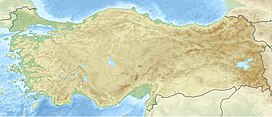Amanian Gate
| Amanian Gate | |
|---|---|
| Bahçe Pass | |
| Traversed by |
|
| Location | Osmaniye Province, Turkey |
| Range | Amanus Mountains |
| Coordinates | 37°11′2″N 36°33′23″E / 37.18389°N 36.55639°ECoordinates: 37°11′2″N 36°33′23″E / 37.18389°N 36.55639°E |
The Amanian Gate (Latin: Amani Portae) or Bahçe Pass (Turkish: Bahçe Geçidi), also known as the Amanus Pass or Amanides Pylae (Ἀμανίδες or Ἀμανικαί Πύλαι 'Amanus Gates'), is a mountain pass located on the border between Osmaniye and Gaziantep provinces in south-central Turkey. The pass provides a way through the northern Amanus Mountains (modern Nur Mountains), connecting Cilicia to southern Anatolia and northern Syria. It is one of two passes through the Amanus, the other being the Syrian Gate to the south.
The Amanian Gate was mentioned in the ancient Nabonidus Chronicle.
The pass played an important role leading to the Battle of Issus. The Persian army advanced through the Amanic Gate or another nearby pass, coming behind the Macedonian army which turned back to face and defeat the Persian army. The exact Persian strategy remains in dispute. According to Jona Lendering, after a part of Alexander the Great army occupied the Syrian Gate, Darius III of Persia decided to lead his army north through the Amanian Gate and place his army between the two Macedonian armies at the town of Issus. However, the Macedonians joined forces before the arrival of Darius, and the outcome was Persian defeat. However, Donald Engels rejects a similar interpretation.
According to some historians, after the conquest of the Levant by the Arab Caliphate, the Mardaites, Christians following either Miaphysitism or Monothelitism, gained a semi-independent status around the Amanus Mountains within the Byzantine-Arab border region. They initially agreed to serve as spies for the Arabs and to guard the Amanian Gate, but their loyalty was intermittent and they often sided with the Byzantines instead.
...
Wikipedia

